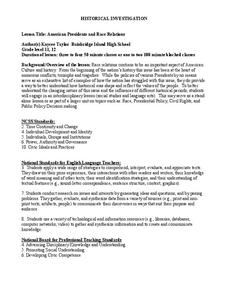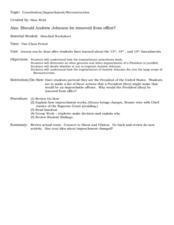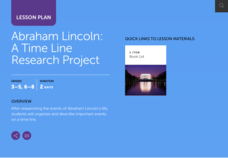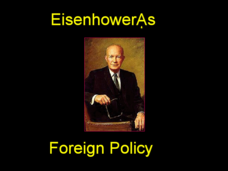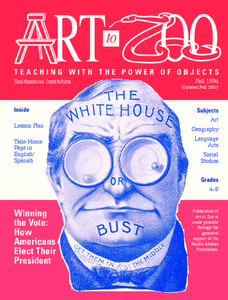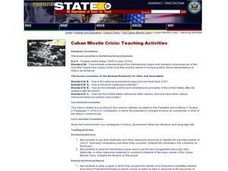Scholastic
Dear Miss Breed
This compelling plan based on the letters in the book Dear Miss Breed engages readers in learning what it was like for Japanese Americans following the attacks at Pearl Harbor. After reading the letters, young scholars will partake in...
Curated OER
The Civil War (1861-1865) Through Maps, Charts, Graphs, & Pictures
True to its titles, this engaging and appealing presentation brings the 1860's into close focus with a number of images and statistics that would delight any Civil War buff. A few graphs allow for pupil input, such as listing the...
National First Ladies' Library
All the News That's Fit to Draw: Political Cartooning and the Presidency
Young scholars research, analyze and study the history of political cartooning in the United States. They recognize a political cartoon, be able to identify the main idea, the symbols and the exaggeration and caricature in political...
Curated OER
The Gettysburg Address (1863): Defining the American Union
Learners explore the Gettysburg Address. In this U. S. history lesson, students examine Abraham Lincoln's speech and it's themes of freedom, equality, and emancipation.
Curated OER
American Presidents and Race Relations
Students discuss the policies of race relations of five presidents. They analyze primary documents to comprehend the various views and actions of five Presidents in regards to race relations. Students evaluate the influence of...
Curated OER
Racists Actions Toward the Native Americans
Young scholars explore Thomas Jefferson and his attitude toward Native Americans. They study maps from European colonization and the westward movement that pushed the Native Americans further west. Students analyze primary source...
Curated OER
Constitution/Impeachment/Reconstruction
Eleventh graders analyze a chart comparing U.S. census data from 1850, 1880, 1900, and 1920. They read a handout summarizing immigration legislation from 1882-1996 and create a graph charting how open / closed U.S. immigration is over time.
Scholastic
Abraham Lincoln: A Time Line Research Project
Though Abraham Lincoln's life was tragically cut short, it was filled with accomplishments and inspiring moments that continue to influence American democracy. Explore the ways the 16th president of the United States made his way from a...
Brown University
Following the U.S. Presidential Election
Election years provide the opportunity to evaluate news media as well as the next prospective president. High schoolers read about the same event in several different news sources, varying in type, origin, and political leaning, before...
Edgate
Discovering New Resources
What is a natural resource, and what resources did the Lewis and Clark expedition seek? After reading an article on the mapping of the west, learners get into small groups to discuss the important natural resources of the period. They...
National Endowment for the Humanities
The Debate in the United States over the League of Nations: Five Camps: From Voices of Consent to Voices of Dissent
Learners explore and discuss Woodrow Wilson's concepts for peace and the League of Nations. They understand efforts made to foster American support for the League and discuss the opposition shown in the Senate.
Curated OER
Eisenhower's Foreign Policy
Good for setting the context for 20th century foreign policy issues, these slides describe key points in Latin America, the Middle East, the Far East, and Europe. US or World History classes will appreciate the concise list on each...
Curated OER
Carter’s Approach to Facing the Energy Crisis
High schoolers examine President Carter's stance on the energy crisis of the 1970s. In this energy crisis instructional activity, students analyze primary sources that feature the crisis during Carter's term. High schoolers script and...
Curated OER
They Were Born Where?
Students assess where the presidents of the United States were born and analyze the role of geography in determining the outcome of presidential elections. They create graphs visualizing the birth and home states of the presidents along...
Curated OER
Ethnography of the Lewis & Clark Expedition
Young scholars research the people that Lewis and Clark encountered on their expedition. In small groups, they conduct research on a group of Native Americans, answer research questions, and contribute information to a class chart...
Curated OER
The 1828 Campaign of Andrew Jackson: Issues in the Election of 1828 and Beyond
Students research the campaign and election issues of Andrew Jackson. In this presidential election instructional activity, students research the campaign of 1828. Students then list the important issues. Students discuss the political...
Curated OER
Revolutions in Latin America: Bolivar, 1813-1814
High schoolers compare the leadership skills of Washington and Bolivar. In this Latin American history lesson, students read biographical information about George Washington and Simon Bolivar. High schoolers compare the men to better...
Humanities Texas
Primary Source Worksheet: John T. McCutcheon, “A Wise Economist Asks a Question”
No joke! Kids learn how to read political cartoons using McCutcheon's drawing as a starting point and then progressing to other images found online.
Curated OER
Getting to Know the Presidents
In this presidents worksheet, students use given web site sources to complete a graphic organizer comparing pairs of presidents, 5 pairs total.
Curated OER
The White House or Bust: How Americans Elect Their President
Students explain the presidential duties and who is eligible to run for president. In this The White House or Bust article, students complete a map of the electoral college. In addition students analyze historical campaign posters....
Curated OER
The Monroe Doctrine: Whose Doctrine Was It?
Was James Monroe the sole contributor of the Monroe Doctrine? Young scholars study the doctrine and cite evidence to show contributions of John Quincy Adams and Thomas Jefferson in its formulation.
Curated OER
Cuban Missile Crisis: Teaching Activities
Learners create a timeline of the important events of John F. Kennedy's presidency. They construct a timeline of the major events of the Cuban Missile Crisis. They compare the Missile Crisis events with their presentation in the movie...
Curated OER
What Made George Washington a Good Military Leader? Powers and Problems
Students list qualities they believe made George Washington an effective military leader. They discuss difficulties Washington faced as Commander-in-Chief and how he responded to the difficulties he faced as the leader of the Continental...
Curated OER
What Made George Washington a Good Military Leader?
Students list qualities they believe made George Washington an effective military leader. They discuss some difficulties Washington faced as Commander-in-Chief and describe his response to the Newburgh Conspiracy.






